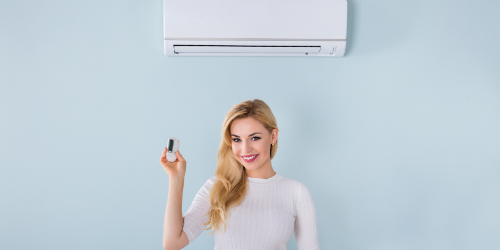Is it cheaper to run AC or dehumidifier?
Contents
- Is it cheaper to run AC or dehumidifier?
- Air conditioner Vs. dehumidifier. Which one is the best?
- Function of an air conditioner
- Function of a dehumidifier
- Difference between AC and dehumidifier
- What’s more energy efficient? AC or dehumidifier?
- Does AC dehumidify?
- Do all AC units have dehumidifiers?
- Which is the best 3 in 1 air conditioner, dehumidifier, and fan?
- FAQ Section
- Wrapping Up
Air conditioner Vs. dehumidifier. Which one is the best?
Feeling sweaty and muggy? Are you wondering whether you must switch on the Air Conditioner (AC) or dehumidifier?
Well, the decision depends on where you live and the air quality at home. If you live in coastal regions or in areas where the climate is moderate or cold with high humidity, you will need a dehumidifier to warm and dehumidify the space.
But, if you live in a hot and humid place, you will require an air conditioner first to cool down the room, and then to dehumidify the space. Air conditioners have a remarkable cooling effect and a fair dehumidification level.
Now comes the critical question. Which among them is cost-efficient and effective?
To get the answer right, you need a comprehensive understanding of the functioning, similarities, and differences between an air conditioner and a dehumidifier.
3 Key Takeaways:
🚀 Dehumidifiers have high energy efficiency and consume only 1/10th power when compared to air conditioners.
🚀 Dehumidifiers can lower your power bills much more efficiently than an AC unit. In fact, a dehumidifier can use its annual saved power to run a refrigerator for four months.
🚀 Dehumidifiers can help improve air quality by reducing mold and allergens.
Function of an air conditioner

An air conditioner is a system or device that replaces warm air with cooler air. Its primary duty is to reduce the temperature of an enclosed area. It can operate in a lot of different modes that can control humidity, air circulation, and air quality.
Function of a dehumidifier
A dehumidifier is a machine or system that removes excess humidity and improves air quality in the house by removing mold and mildew growth, and dust mites. It reduces condensation, cracks, and ghosting on walls, eliminates wood rot and pest infestation, and preserves the structural integrity of your home. We have found an useful video on dehumidifier working for you to check it out.
Difference between AC and dehumidifier
Let’s dive straight into the basic distinctions between air conditioners and dehumidifiers?
Air conditioners distribute hot air outdoors and create cold blasts indoors. It does not remove all the fungus or mold. On the other hand, dehumidifiers remove moisture from the air, emit hot air indoors, and destroys mold growth, mildew, and dust mites.
In super wet and humid spaces such as water restoration sites, flooded areas, and other water damaged areas, the air conditioner will not be able to dehumidify adequately. Only a dehumidifier can do the job efficiently.
What’s more energy efficient? AC or dehumidifier?
Compared to air conditioning units, dehumidifiers use less power.
Let your AC and dehumidifier run for 24 hours. You will see that the energy use and power consumption is quite high in your A C . Excess humidity and heat increases the cooling cost of your HVAC system when deployed across your whole house.
Dehumidifiers have high energy efficiency and consume only 1/10th power when compared to air conditioners. In fact, your dehumidifier can use its annual saved power, to run a refrigerator for four months. It lowers your power bills much efficiently than the AC unit.
So, if you want to save money, you must invest in the best energy efficient dehumidifiers.
Dehumidifier power consumption mainly depends on the type of unit. Desiccant dehumidifiers have lower power consumption when compared to compressor-based and thermo-electric types.
If you want to reduce your power bill further, make sure your dehumidifier has the following power saving features.
‣ Energy star rating
‣ Digital humidistat control
‣ Optimal fan speed sensor
‣ Defrost cycle duration
‣ Auto restart functionality
‣ Filters, timers, and drain pumps
You also need to make sure that the pint per day capacity, tank capacity, and room size are optimal for maximized cost efficiency.
Does AC dehumidify?
The answer to this question is a big yes. Though an air conditioner’s primary job is to cool your room, it can also dehumidify the space to a certain extent. When heat and humidity are high, air conditioners will have to work their compressors really hard to make the whole house feel more comfortable.
Dehumidification is a byproduct of the way modern ACs functions.
For the air conditioner to cool your home, it needs to pull in hot air and run it over refrigerant coils. This process removes water vapor from the air, which condenses and collects in the water tank to be drained away. When the humidity is high, excess water vapor reduces airflow, causing the coil to freeze and the compressor to fail. Thus, for your air conditioner to dehumidify without any internal damage, you need to turn on the dry mode.
Do all AC units have dehumidifiers?
All air conditioners (both split and window units) can reduce your living space’s humidity level only to a certain extent. Some air conditioners have a dry mode option, which makes them act as effective dehumidifiers. The dry mode or dehumidifier mode reduces the temperature of the room by reducing humidity levels.
For building spaces such as attics or basements where the window unit cannot be installed, you can use a portable air conditioner on dehumidifier mode. Hence in a way, air conditioner units have dehumidifiers in them.
If you want increased cooling capacity along with more moisture removal, you can try the air conditioner, dehumidifier, and fan combo.
Which is the best 3 in 1 air conditioner, dehumidifier, and fan?
When your home becomes hot and humid in summer, there is nothing that adds more comfort and health than the fantastic 3 in 1 combo of air conditioner, dehumidifier, and fan. It gets rid of uncomfortable mugginess and health hazards and provides a pleasant and cool home environment.
This device reduces air temperature and removes excess moisture while saving up to 30% on your energy bill. These air conditioning systems are portable, compact, and easy to use.
Some of the best 3 in 1 air conditioner, dehumidifier, and fan combos are Whynter ARC-14S 14,000 BTU Dual Hose Portable unit, Whitewing Superdry 90, and Maytag M1200.
FAQ Section
1. Does a dehumidifier help the AC?
The dehumidifier does a lot of work to help the AC run efficiently. Firstly it is one of the best ways to reduce air temperature by removing excess moisture in the room. Secondly the reheater in the unit directs the excess heat outside the home. Hence the dehumidifier helps the air conditioner to conveniently work less to lower the discomfort level in the room.
2. What is dry mode in AC?
Turning on the dry mode in your A C is like turning on a large dehumidifier that has cooling effects as well. It is one of the best ways to remove excess moisture using an air conditioner. The dry mode will not dry out all the moisture, but it will make the user environment quite healthy and comfortable. Using the dry mode also helps increase energy savings and lower carbon footprint.
3. With AC on, the humidity is still 58. Should I get a dehumidifier?
According to the US Environmental Protection Agency, for a healthy and comfortable home, the humidity levels of the house must be between 30% and 50%.
If the humidity in your site is 58%, then you must use the best dehumidifier to lower moisture levels, and preserve the structural integrity of your home, reduce health hazards, eliminate mold, mildew, dust mites infection, and pest infestation.
4. Which cools better? AC or dehumidifier?
Without any doubt, the answer to this question is the air conditioning unit. Here’s the reason why. The cooling capacity of the AC is much greater than the dehumidifier that offers only dehumidification and heat.
Wrapping Up
Ready to buy a dehumidification unit, air conditioner, or a combo of both?
After reading our detailed deliberation on the pros, cons, differences, and synergies, we are pretty sure you can choose the right one for your whole house or business. Check out our reviews (All Rights Reserved) and customer feedback on social media channels such as Pinterest, Instagram, and Twitter before choosing your best buy.

About The Author
Olivia — a self-confessed air quality addict — is a home climate enthusiast, fresh air advocate, and someone with deep personal experience and knowledge about mold extermination. Her work was mentioned in countless notable humidity publications. Previously she was an editor at Mold Remediation.